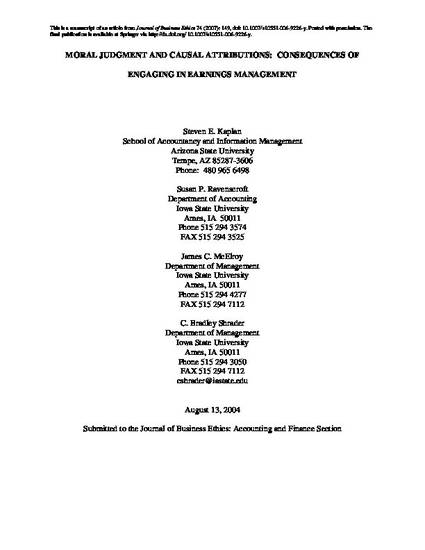
Article
Moral Judgment and Causal Attributions: Consequences of Engaging in Earnings Management
Journal of Business Ethics
Document Type
Article
Publication Version
Submitted Manuscript
Publication Date
1-1-2007
DOI
10.1007/s10551-006-9226-y
Abstract
Recent, well-publicized accounting scandals have shown that the penalties outsiders impose on those found culpable of earnings management can be severe. However, less is known about how colleagues within internal labor markets respond when they believe fellow managers have managed earnings. Designers of responsibility accounting systems need to understand the reputational costs managers impose on one another within internal labor markets. In an experimental study, 159 evening MBA students were asked to assume the role of a manager in a company and respond to a scenario in which another manager (the target manager) has the opportunity to engage in earnings management. Participants provided causal attributions, assessed the morality of the target manager, and indicated whether they would change their judgments about the target manager’s reputation. The study manipulated three between-subjects factors: (1) whether the target manager chose to engage in earnings management, (2) whether the company’s budgetary control system was rigid or flexible, and (3) whether the target manager’s work history was average or above average. We found that causal attributions are affected more by the budgetary systems when the target did not manage earnings than when the manager did. We also found that morality judgments were significantly associated with the target manager’s behavior, but not with the budgetary system. In addition, participants’ judgments about the target manager’s reputation were more strongly associated with morality judgments than with causal attributions. We discuss implications of the role of reputation in management control systems design.
Copyright Owner
Kluwer Academic Publishers
Copyright Date
2007
Language
en
File Format
application/pdf
Citation Information
Steven E. Kaplan, James C. McElroy, Sue Ravenscroft and Charles B. Shrader. "Moral Judgment and Causal Attributions: Consequences of Engaging in Earnings Management" Journal of Business Ethics Vol. 74 Iss. 2 (2007) p. 149 - 164 Available at: http://works.bepress.com/sue_ravenscroft/4/

This is a manuscript of an article from Journal of Business Ethics 74 (2007): 149, doi: 10.1007/s10551-006-9226-y. Posted with permission. The final publication is available at Springer via http://dx.doi.org/ 10.1007/s10551-006-9226-y.